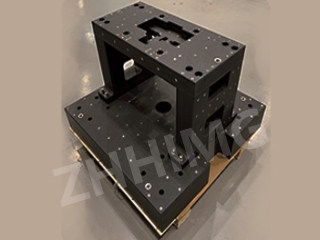Granite is a popular material in the manufacturing industry, known for its high strength and durability. It is commonly used for mechanical components of precision processing devices due to its ability to maintain precision and stability, even under extreme conditions. Although granite mechanical components offer many benefits, there are also some disadvantages that should be considered. In this article, we will explore the advantages and disadvantages of granite mechanical components.
Advantages of Granite Mechanical Components
1. Stability and Precision: Granite is an extremely rigid material that is able to maintain its shape and stability even under high stress conditions. This makes it a perfect material for use in precision machinery, where accuracy is essential. Due to its high level of stability and resistance to deformation, it is able to maintain its shape and position with extreme precision.
2. Wear Resistance: Granite is a tough and durable material that offers excellent wear resistance. It is able to withstand abrasion and impact, making it an ideal material for use in harsh environments. This makes it a preferred choice for mechanical components that require high levels of wear resistance.
3. Corrosion Resistance: Granite is non-corrosive and does not react with most chemicals. This makes it an ideal material for use in aggressive environments where high levels of corrosion resistance are required.
4. Thermal Stability: Granite has high thermal stability and is able to withstand high temperatures without degrading. This makes it a preferred choice in applications that require high-temperature resistance.
Disadvantages of Granite Mechanical Components
1. Cost: Granite is an expensive material and the cost of manufacturing precision components from granite is significantly higher than other materials. This can make it an expensive choice for small-scale manufacturing.
2. Heavyweight: Granite is a heavy material and its weight can make it difficult to handle during manufacturing and maintenance. This can be an issue when designing precision mechanisms that require lightweight components.
3. Limited Design Freedom: Granite is difficult to machine and it is not possible to produce complex shapes or designs. This can limit the overall design freedom of precision components made of granite.
4. Brittle: Granite is a brittle material and can crack or fracture under high stress. This can be a disadvantage in applications that require high levels of shock resistance.
Conclusion
In summary, the advantages of granite mechanical components for precision processing devices include stability and precision, wear resistance, corrosion resistance, and thermal stability. However, there are also some disadvantages to consider, including high cost, heavyweight, limited design freedom, and brittleness. Ultimately, the decision to use granite mechanical components will depend on the specific requirements of the application and the available resources. Despite its limitations, granite remains an attractive option for mechanical components in many specialized applications.
Post time: Nov-25-2023

